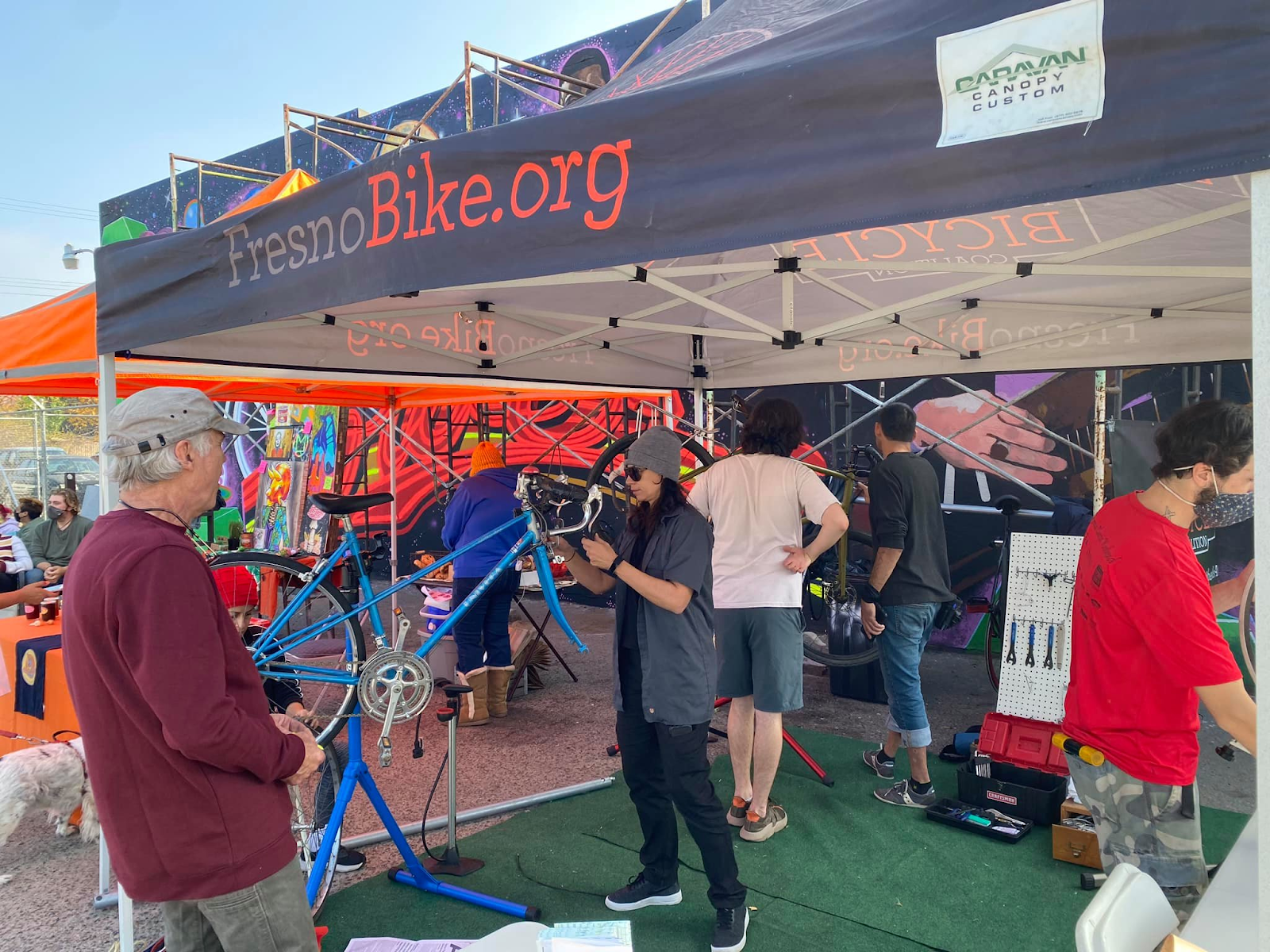December 2021
The holiday season is here, with some rainy days to help replenish the parched land. You don’t have to give up bicycling when it rains to get where you need to go. Here are some tips to help keep you safe and comfortable in the wet weather:
- Visibility is decreased when it rains, so turn on your bike lights.
- Slow down, particularly in turns where your tires can slide on slick pavement.
- Don’t ride through standing water as you can’t see what hazards may lurk beneath the surface.
- Consider investing in a waterproof jacket and pants.
- If your bike doesn’t have fenders, consider getting a plastic fender that costs only about $15 and attaches to the seatpost.
In this month’s Newsletter:
- Where does funding for bicycle infrastructure come from, and will there be an increase from the new federal infrastructure bill?
- There’s no Bike Café this month, but if you missed last month's Bike Café on what to do if you get in a bike crash, the recording is available.
- FCBC Board elections are live. You can vote online or at the FCBC general membership meeting on Thursday, December 16.
- FCBC now offers FYOB–Fix Your Own Bike–at the FCBC Repair Station once a month in the Tower District.
- The next chapter from the pending book by Juan Flores on bicycling in Fresno discusses the Sugar Pine Trail.
Bicycle Infrastructure: Funding
Transportation funding is complex, with various federal, state, and local sources. Most funding is from federal and state fuel taxes, but there are also weight fees, vehicle registration fees, and in some places, tolls and property taxes that go towards transportation. The taxes and fees are distributed to Caltrans for state highways and interstates and to local governments to maintain or improve the local streets and roads, but they can also choose to fund highway improvements.
Many counties, including Fresno County, have sales taxes dedicated to transportation. As passed by the voters, the Measure C extension in effect from 2006 to 2026 is a half-cent sales tax that allocates 0.9% of the program, or about $15 million over 20 years, for bicycle facilities. This does not include another 3.09%, or about $53.3 million over 20 years, for trails. Local agencies have flexibility in the allocations that they receive that typically go towards road maintenance or improvement projects, which often include bike lanes. A subsequent amendment to the expenditure plans allows up to 20% of the trail funding to go towards maintenance of the trail. The effort to renew Measure C for the next 20 years has started with the formation of a Technical Working Group. The focus of the next extension is expected to be less on highway building and more on local streets and roads.
The $1.2 trillion federal infrastructure bill was signed into law by President Biden on November 15. It provides $110 billion for roads and bridges, and there is a 60% increase in funding for the Transportation Alternatives Program from $850 million to $1.38 billion in 2022, and increasing to $1.48 billion in 2026. This program funds smaller scale projects such as bicycle and pedestrian facilities and is partly the source of funding for the Active Transportation Program (ATP) in California.
California’s ATP was created by legislation in 2013. It consolidated various programs such as the Transportation Alternatives Program, Bicycle Transportation Account, and Safe Routes to School Program. In 2017 Senate Bill 1, the Road Repair and Accountability Act, stipulates that $100 million is available annually for active transportation. This is on top of about $120 million made available from other state and federal sources. Half the funding is distributed through a competitive grant program. 40% goes to metropolitan planning organizations in urban areas with populations greater than 200,000. The remaining 10% goes to smaller urban and rural areas. The next call for projects is scheduled for March, with applications due June 15, 2022.
Developers are usually required to build all infrastructure within the project boundaries or pay development fees that would allow the improvements to be built later. The improvements are to be consistent with the jurisdiction’s General Plan and any additional conditions imposed by the planning or engineering departments. Newer developments therefore will have more bicycling facilities than in older areas before such requirements were in place.
It can take years or longer to get bicycle facilities constructed. It is important to be engaged in the process to make sure that the decision-makers are aware of the issues and needs, which typically get documented in an agency’s Bicycle Master Plan or Active Transportation Plan. The local agency can then prioritize projects and look at ways of funding the improvements.

FCBC Bike Café
The Bike Café is taking a coffee break for the month of December but will be back in January. If you missed the Bike Café in November with bicycle crash attorney and FCBC member Jim Pocrass discussing what to do if you get into a bicycle crash, you can watch the recording. There was lots of useful information including whether your automobile or home insurance policy will give you coverage for your bike and the importance of having coverage in case you are at fault in a crash and cause damage to an expensive vehicle.
The next Bike Cafe is scheduled for January 11, 2022. If you have any suggestions for future topics, please send them to events@fresnobike.org.
FCBC Bicycle Station
FCBC has started setting up a monthly pop-up bicycle repair station in the Tower District to help bike owners repair their own bikes. Thanks to FCBC member Julie Congi and Tower Velo owner Chris Eacock for providing their professional expertise. The next event is scheduled for Sunday, January 16 at the Van Ness Village Vendor Fair.

Board Elections
Voting is open for FCBC Board member elections. All current FCBC members should have received online voting instructions, but votes will also be taken at the December membership meeting on December 16, after which results will be announced.
FCBC is a 501(c)(3) nonprofit organization, and Board members set the direction, plan the activities, and manage the resources of FCBC. In January, the Board members will have a strategic planning meeting and plan the activities for the year.
More information on the Board elections can be found in the FCBC bylaws. Any questions can be directed to info@fresnobike.org.
Upcoming Book on Bicycling in Fresno
Below is the fourth chapter in the book that FCBC Vice Chair Juan Flores is writing on bicycling in Fresno. This installment is a continuation of the discussion of the Sugar Pine Trail from the previous chapter. Juan welcomes any comments, corrections, and constructive criticism at juan@fresnobike.org.
Sugar Pine Trail
One of the most accessible and comfortable bike trails that connects the cities of Fresno and Clovis is the Sugar Pine Trail. The Sugar Pine Railroad was one of the historic railroads that brought lumber from the Sierra Nevadas to the Fresno and Clovis area in California for processing. There was lumber processing in the community of Pinedale and in Clovis. Over time, these lumber railroads were shut down and remained dormant until communities began converting through the rail to trail process.
The community of Pinedale has a rich, proud history that is not widely known. It was established as a company town for the Sugar Pine Lumber Company of Fresno on March 24, 1923. The Sugar Pine Lumber Mill of Pinedale was the largest and most modern mill of its time.
At around the same time, a group of Michigan lumbermen began acquiring thousands of acres of timber in the Sierra Nevadas about 75 miles northeast of Fresno. They built a dam across Stevenson Creek to create a lake to allow them to move freshly cut timber to a mill beside the lake, and they constructed a 42-mile long flume that started at the foot of the dam. The lumber was first processed at the mill and then brought via the flume to a mill in east Clovis, where it was further processed and finished. There was a network of rails that moved lumber in and around the various milling facilities in Clovis. These remnants of the network of lumber yard rails were the foundation of our current Sugar Pine Trail and Old Clovis Town Trail.
To reach the northern trailhead in Fresno, from State Route 41, take the Friant Road/Blackstone Avenue exit. Go south on Friant/Blackstone 0.5 mile and turn left on Nees Avenue. The trailhead is on the left under the freeway overpass on the north side of Nees Avenue. There is no parking at the trailhead, but you will be able to park at the River Park shopping complex to the south, where there is a wide choice of restaurants and other eateries. The trailhead is equipped with benches, a drinking fountain, and a bike repair station.
As you leave the trailhead of the Sugar Pine Trail, you will continue to travel northeast along the trail as it parallels Cole Avenue through a residential part of north Fresno on a wide corridor that is bordered by maturing trees. When you reach the intersection of Cole Avenue and Shepherd Avenue, you can turn left and use bike lanes to go to Woodward Park, or you can stay on the trail and head east along Shepherd Avenue towards Clovis.
Some underpasses along the trail offer safe passage across busy streets. Various restaurants and stores are within walking distance of the trail along Shepherd Avenue.
At the southwest corner of the intersection of Shepherd Avenue and Willow Avenue is another trailhead, with a parking lot. The trail turns south and meets the Clovis Old Town Trail between Teague Avenue and Nees Avenue. This trail continues southeast into Clovis. There's also a spur of the trail that travels north along Willow Avenue, passing Clovis Community College and Clovis North High School before ending at Copper Avenue. Eventually that trail will connect to the Copper Avenue Trail, which connects back to Woodward Park and the Eaton Trail. The City of Clovis also has plans for a trail on the north side of Shepherd Avenue between Willow Avenue and Sunnyside Avenue to be constructed as development occurs.
Next General Membership Meeting
The next general membership meeting is scheduled for Thursday, December 16 at 7:30 pm via Zoom. Everyone is welcome to join the virtual meeting. In normal times, the December general membership meeting would be held at an eatery, to be followed by a ride through Candy Cane Lane (Cindy Lane) in Clovis to enjoy the holiday lights. The group ride will not occur this year, but FCBC members are encouraged to ride there on their own.
Membership
If you are not yet a member of FCBC or need to renew, please visit https://fresnobike.org/join to become a member or renew your membership.
Have a comment or suggestion? Contact us at info@fresnobike.org